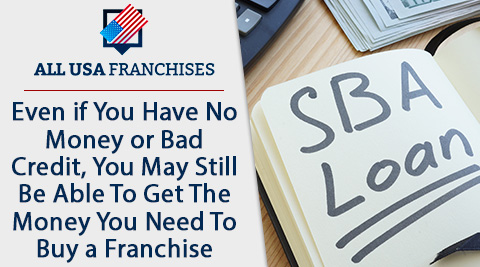To finance a franchise with no money, consider options like business partnerships, franchisor financing, or government grants and loans. Seeking the advice of a financial advisor can provide customized solutions for your unique situation.
Embarking on a franchise venture often requires significant financial investment, which can be a hurdle if you lack capital. Creative financing solutions are essential for aspiring entrepreneurs without readily available funds. Crafting a robust business plan can attract investors and partners who see the potential in your franchise dream.
Franchisors themselves sometimes offer financing programs to help new franchisees. Additionally, government-backed loans, designed to support small businesses, can be instrumental in getting your franchise off the ground. Navigating through these alternatives demands diligence and a strategic approach to securing the necessary funds to realize your franchising goals.

Credit: www.allusafranchises.com
Introduction To Franchise Financing
Franchise financing can unlock the doors to business ownership. An initial investment, however, often poses a substantial hurdle. Creative financial solutions become crucial for budding franchisees without available capital. This post explores strategic paths to successfully finance a franchise even when funds are scarce.
The Basics Of Franchise Ownership
Owning a franchise means purchasing the right to operate a business under an established brand. This package includes a proven business model, training, and ongoing support. It’s crucial to understand that franchisors typically require an upfront franchise fee and additional start-up costs.
- Franchise fee: A one-time payment to the franchisor.
- Start-up costs: Essential expenses like real estate, inventory, and equipment.
- Royalty fees: Regular payments for continuous franchisor support.
Financial Challenges For Aspiring Entrepreneurs
Embarking on a franchising journey often involves sizable financial obligations. Entrepreneurs face capital constraints that may limit their ability to cover initial costs. From franchise fees to real estate and equipment, the monetary demands can overwhelm.
| Franchise Requirement | Estimated Cost Range |
|---|---|
| Franchise Fee | $20,000 – $50,000 |
| Start-up Costs | $100,000 – $300,000 |
| Royalty Fees | Variable |
Potential franchisees must navigate these financial challenges carefully. Lack of funds need not be a roadblock. Instead, it’s an opportunity to seek out alternate routes to franchise ownership.
Evaluating Your Current Financial Position
Before diving into franchise ownership, understand your finances. Knowing where you stand is key. It helps to make smart choices. You might think you have no money. But assessing your situation might reveal opportunities. Let’s explore how to do that.
Asset Assessment And Liabilities Evaluation
Start by listing all that you own. This includes your savings, property, and investments. These are your assets. Next, write down what you owe. These are your liabilities. Subtract liabilities from assets. This number is your net worth.
| Assets | Liabilities | Net Worth |
|---|---|---|
| Savings, property, investments | Mortgage, loans, credit cards | Assets minus liabilities |
Credit Score Significance In Franchise Financing
Your credit score matters. Lenders look at it first. A high score means better loan terms. It might even help get your franchise dream funded. Check your score now. Fix any errors. Improve it if necessary. With a good score, financing options might open up.
- Check credit report annually
- Dispute any credit report errors
- Pay bills on time to boost credit score
Exploring Franchise Financing Options
So, you’ve set your sights on owning a franchise but your wallet says otherwise. Fear not—various financing options can turn your business dreams into reality, even if your savings account isn’t brimming with cash.
Traditional Bank Loans And Their Limitations
Getting a loan from a bank might seem like the go-to method for financing a franchise. It’s a path many have taken. Yet, it’s not always a walk in the park. Banks often want proof that you can pay back the loan. This means showing them a strong credit history, collateral, and a solid business plan.
They might also require an in-depth look at the franchise’s history. Is the brand successful? Are other franchisees happy and making money? Banks dive deep into these details before saying yes.
So, what if a bank loan isn’t an option for you? Perhaps your credit score isn’t shining, or you’re missing collateral. Banks can then become a closed door. But don’t worry; other avenues await your journey to franchise ownership.
Alternative Lenders And Creative Financing Methods
When traditional bank loans aren’t a match, alternative lenders may be your new best friends. They have different rules and can be more flexible. Options might include:
- Online lenders: They operate on the internet and can offer faster responses and less strict requirements.
- Business credit cards: If you’re eyeing smaller expenses, a business credit card can be helpful. Just keep an eye on interest rates.
- Rollovers as Business Start-ups (ROBS): This lets you use retirement funds for your franchise without early withdrawal penalties.
You might also explore creative solutions. Partner with investors or consider a home equity line of credit if you’re a homeowner. Another choice could be crowdfunding, where you raise small amounts of money from many people.
Franchise financing is no one-size-fits-all journey. Every aspiring franchise owner has unique circumstances. Understanding the available options sets the stage for an informed decision towards your venture.
Leveraging Personal And Professional Networks
Dreaming of owning a franchise with zero capital might feel like a fantasy. But, with a robust personal and professional network, it can turn into reality. Your community holds immense potential in helping you finance your entrepreneurial journey. This section explores how you can tap into these networks effectively.
Family And Friend Borrowing: Navigating The Risks
Borrowing from loved ones comes with its own set of challenges. It is essential to approach this option with clarity and caution.
- Formalize the agreement: Create a contract to avoid future misunderstandings.
- Communicate: Be transparent about risks and potential returns.
- Set clear terms: Define repayment schedules and interest rates, if any.
This borrowing method can offer flexible financing solutions while fostering trust and support from those closest to you.
Networking For Investors And Strategic Partnerships
Your professional network is a goldmine for potential investors and partners. Active networking can open doors to valuable resources.
- Attend industry events: To connect with like-minded entrepreneurs and financiers.
- Use social media: LinkedIn and other platforms are powerful for building connections.
- Prepare an elevator pitch: Be ready to share your vision succinctly and compellingly.
Building strategic partnerships can also lead to cost savings and increased credibility for your franchise.
Government Programs And Grants
Taking the leap into business ownership is thrilling. Dreamers can embark on this quest even with empty pockets. Government programs and grants can turn those dreams into reality.
Small Business Administration (sba) Loans
The Small Business Administration offers loans for hopeful franchisees. SBA loans can be a lifeline. They offer low-interest rates and long repayment terms. To start, study the SBA’s 7(a) loan program. Applicants must prove creditworthiness and business viability.
An SBA loan demands a solid business plan and some collateral. But, many achieve their franchise goals with this support. Banks favor these loans. They know the SBA can guarantee up to 85% of the loan amount. This assurance lowers risk for lenders. Thus, your chances of approval soar.
Local Government Grants And Support Systems
Don’t overlook your local community. Local government grants support upcoming entrepreneurs. Grant programs vary widely. Needs and conditions apply. Research is key. Visit your local government website. Find opportunities tailor-made for your franchise plan.
Some communities offer free resources, training, or reduced-rate real estate. Such perks can significantly reduce initial costs. Building a network within local business circles can reveal hidden support systems. Relationships with local officials and other business owners can pave the way for success.

Credit: www.upmenu.com
Building A Convincing Business Plan
Embarking on a franchise journey without capital seems daunting. Yet, creativity and strategy can pave the way. A convincing business plan functions as a road map. It guides you and assures lenders your vision is both profitable and practical.
The importance of a robust business planThe Importance Of A Robust Business Plan
A well-thought-out business plan is your first major step. It convinces lenders to invest in your franchise dream. It shows you understand the market. It demonstrates your willingness to work hard. In essence, it’s the linchpin of your franchise funding strategy.
Key components that appeal to potential financiersKey Components That Appeal To Potential Financiers
Your business plan must have certain elements to catch a financier’s eye. Each component should highlight your franchise’s potential:
- Executive Summary: This is the hook. Briefly present your franchise idea, mission, and profit forecast.
- Market Analysis: Show clear understanding of the industry. Include trends and target market insights.
- Management Structure: Detail your team’s experience. Prove your capability to steer the franchise to success.
- Marketing Plan: Outline how you will attract and retain customers. Discuss branding, channels, and strategies.
- Financial Projections: Present realistic revenue models. Include detailed costs, profits, and break-even analysis.
Each section must reinforce your potential for success. Use clear, concise language. Charts and tables can display data effectively. Remember, an impeccable plan speaks volumes. It’s your ticket to securing that much-needed funding.

Credit: www.merchantmaverick.com
Frequently Asked Questions On How To Finance A Franchise With No Money
Is It Hard To Get Financing For A Franchise?
Securing financing for a franchise can be challenging, as it depends on your creditworthiness, the franchise’s success rate, and lender policies. Strong business plans and franchisor support often improve your chances of getting a loan.
How To Get Into A Franchise With No Money?
Starting a franchise with no money can be challenging. Explore partnering with investors, securing a loan, or consider franchisor financing options. Solicit funds from friends and family or research grants and competitions for start-up capital. Lastly, some franchises offer in-house financing or lower-cost options.
How Much Is A Downpayment On A Franchise?
A franchise downpayment typically ranges from 10% to 20% of the total investment cost. The exact amount varies depending on the specific franchise requirements.
Can You Buy A Franchise With Bad Credit?
Yes, buying a franchise with bad credit is possible but challenging. You may face higher interest rates or require a substantial down payment. Partnering with an investor or securing alternative financing could improve your chances. Always consult with franchisors about their credit requirements.
Can You Finance A Franchise Without Money?
Starting a franchise without personal capital can be challenging, but options such as partnering, loans, and franchisor financing could help.
Conclusion
Starting a franchise with limited funds can seem daunting, yet it’s possible with the right approach. Explore various financing options, from crowdfunding to finding an angel investor. Remember, careful planning and a solid business proposal can unlock doors to capital.
Dreams of entrepreneurship await – go forth and conquer!










